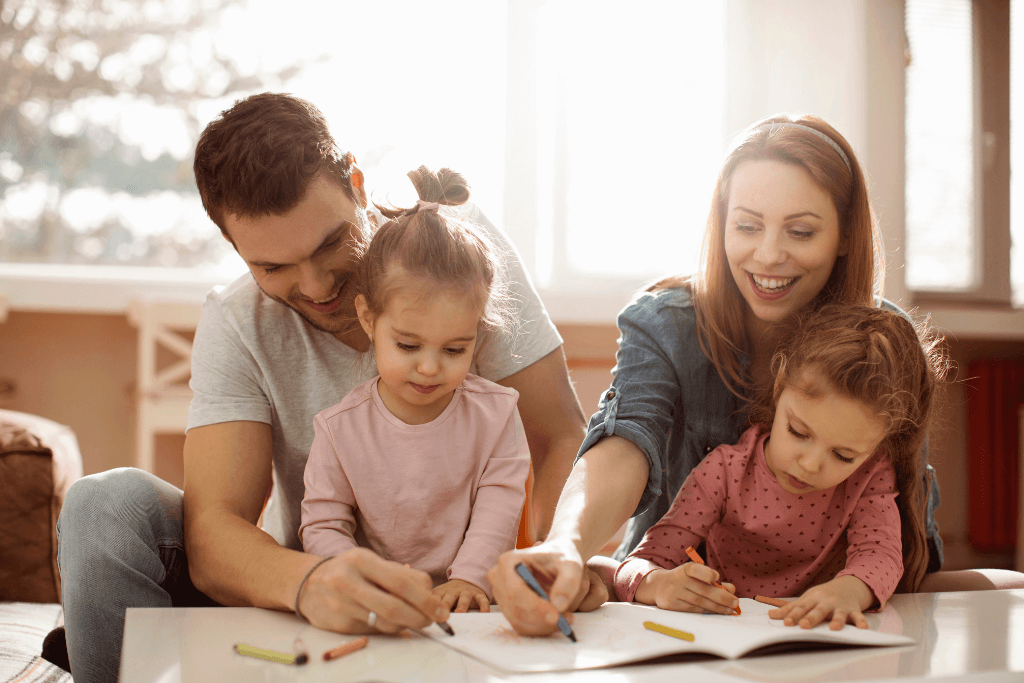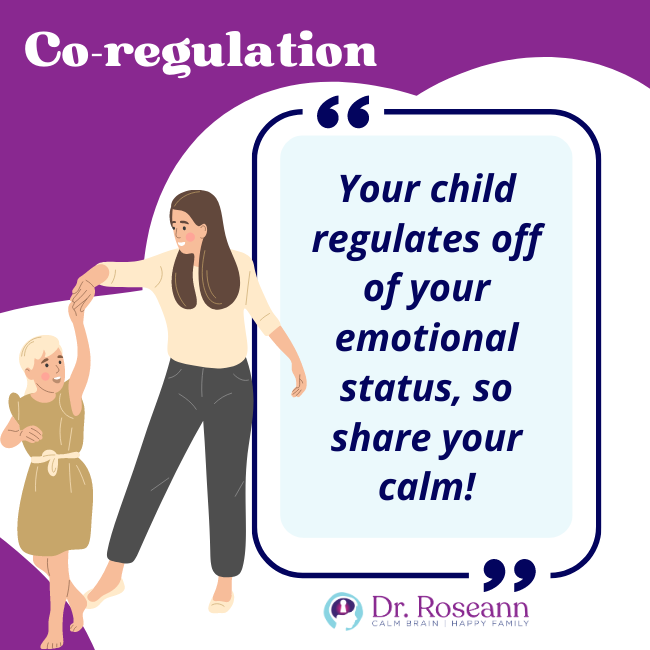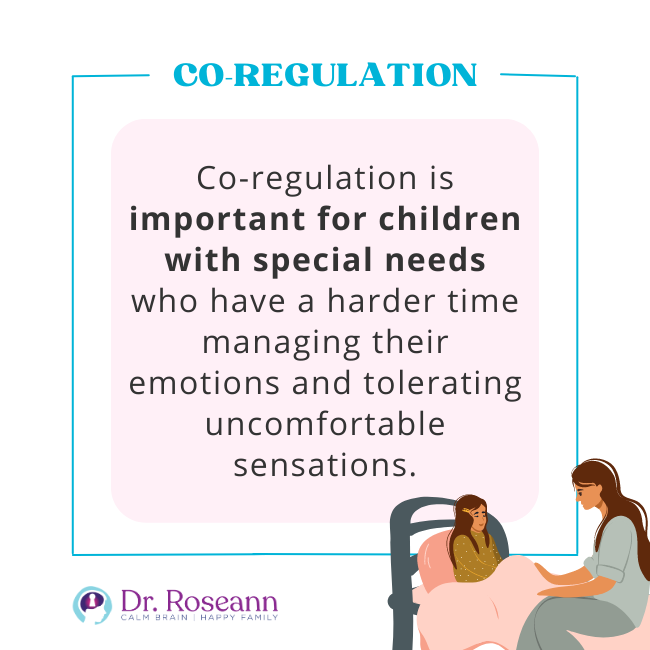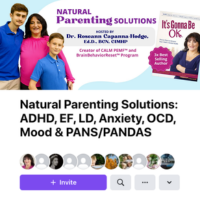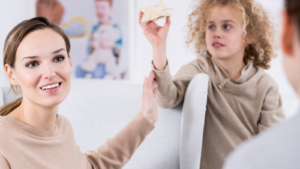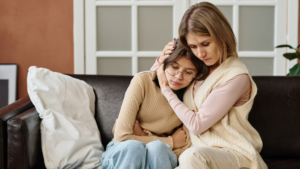Parenting is a rewarding but challenging journey that requires us to guide our children as they navigate the ups and downs of life. One of the most important skills we can teach our children is emotional regulation, which is the ability to manage big feelings and stay calm in the face of challenges.
However, teaching emotional regulation isn't always easy, especially when we have a dysregulated kid who may have interfering clinical issues. That's where co-regulation comes in.
What is Co-Regulation in Parenting?
Co-regulation is the idea that emotional regulation is a shared experience between parent and child. When our children are feeling dysregulated, they look to us for guidance and support in managing their emotions. That means they are taking in everything we do. So when you say to Ella, “Calm down” with a frowny face, she isn't going to learn anything.
Co-regulation involves modeling healthy emotional regulation ourselves and creating a supportive environment that allows our children to develop the abilities to regulate their emotions. The good news is that every parent can learn these skills, and we'll dive into this in this blog.
What is the Importance of Co-Regulation and Parenting?
Co-regulation is key for promoting our children's mental health and social-emotional development. Despite our focus on grades as the benchmark of mental health, emotional regulation skills have been linked to positive outcomes in many areas of life, including academic success, healthy relationships, and overall well-being.
When our children feel seen, heard, and supported in managing their feelings, they are better able to cope with stress and solve problems effectively. This can lead to improved mental health outcomes and increased resilience in the face of life's challenges.
How Emotional Regulation Develops in the Brain
Emotional regulation skills develop gradually over time, with significant progress occurring in early childhood. Every childhood experience shapes it.
The prefrontal cortex, which is responsible for executive functions like self-regulation, is not fully developed until early adulthood. While some children are more attuned to their environment and develop EF skills more readily, even children who have clinical issues such as ADHD or autism can learn EF skills when directly and explicitly taught.
I recently worked with twins with ADHD and one more easily learned these skills than the other after neurofeedback. Josh needed more practice than his twin Jack but eventually gained the skills.
Social-emotional experiences in childhood and adolescence have been shown to have a significant impact on the development of emotional regulation skills. Positive experiences with co-regulation can help to promote the development of neural pathways associated with emotional regulation.
How Co-Regulation Helps the Brain
Co-regulation has been shown to have a direct impact on brain function. Studies have found that positive social-emotional experiences, including co-regulation, can lead to changes in brain function, including increased activity in regions associated with emotional regulation (Auerbach et. al, 2010 and Davidovitch & Koren-Karie, 2013).
By creating supportive environments for our children to practice emotional regulation, we can help to strengthen these neural pathways and promote healthy brain function.
Co-Regulation and Special Needs Children
Co-regulation is particularly important for children with special needs who may face additional challenges in managing their emotions and tolerating uncomfortable sensations. Children with special needs may struggle with emotional regulation due to factors like sensory overload, communication difficulties, or executive functioning deficits. Co-regulation strategies that focus on meeting the unique needs of these children can be particularly effective.
Co-Regulation and Autism
Research studies have shown that co-regulation is particularly beneficial for children with autism spectrum disorder (ASD). Co-regulation strategies that focus on building trust, promoting social interaction, and providing sensory input can be highly beneficial in promoting emotional regulation in children with ASD (Muller et al., 2003). Studies have found that children with ASD who receive co-regulation interventions have demonstrated improved social skills and emotional regulation skills (Muller et al., 2003).
Co-Regulation and ADHD
Studies have shown co-regulation strategies for children with attention deficit hyperactivity disorder (ADHD) who may struggle with impulse control and emotional regulation (Auerbach et al., 2010) can improve behavior. Co-regulation strategies like deep breathing, mindfulness, and sensory integration have been found to be particularly helpful in promoting emotional regulation in children with ADHD (Auerbach et al., 2010).
Co-Regulation and Anxiety, OCD, Mood Disorder, and PANS/PANDAS
Complex clinical issues such as anxiety, obsessive-compulsive disorder (OCD), mood disorders, and PANS/PANDAS (Pediatric Autoimmune Neuropsychiatric Disorders Associated with Streptococcal Infections and Pediatric Acute-Onset Neuropsychiatric Syndrome) can also benefit from co-regulation strategies.
These conditions can all affect emotional regulation and make it difficult for children to put the brakes on big feelings and tolerate uncomfortable sensations. Co-regulation strategies like deep breathing, mindfulness, and cognitive-behavioral interventions can be effective in helping children with these conditions develop emotional regulation skills (Kashdan et. al, 2015).
What are Examples of Co-Regulation in Parenting?
Co-regulation is really about supporting the development of the autonomic nervous system (ANS), which is our bodies' stress response system. Dysregulated kids struggle with over activation of their nervous system to often benign stressors or sensory information.
Coregulation strategies responsive communication, labeling emotions, matching their energy, being physically close to your child with hugs, etc. are examples of co-regulation strategies every parent can and should use.
For example, if your teen becomes angry when you ask them to do their homework, don't match their anger and instead meet them with a calm tone and facial expression so they can co-regulate off of your energy.
Another example is a child who is having a sensory meltdown. Instead of punishing them, scoop them up and hug them until your own calm settles them down.
What are Some Co-Regulation Strategies?
Sharing your calm isn't always easy but it is important in helping your child move from a dysregulated brain to a calm brain. When our kids are upset, it can be difficult to know what to do or say to help them calm down. That's where co-regulation comes in! But how do we go about doing this?
Here are some of my favorite co-regulation strategies that parents can use to help their children transition from a dysregulated state to a calm one.
CALM Brain Co-Regulation Strategies
Put Your Own Oxygen Mask on First
Another important co-regulation strategy is to prioritize our own self-care. As the saying goes, “put your own oxygen mask on first.” If we're not taking care of ourselves, it's going to be much harder to support our children in managing their emotions.
It means making sure we're getting enough sleep, eating well, and taking time for activities that help us feel grounded and calm, whether that's yoga, meditation, or simply spending time in nature.
It's also important to recognize when we're feeling overwhelmed or triggered ourselves, and take steps to regulate our own emotions before attempting to help our children.
Things like taking a few deep breaths, going for a walk, or even stepping away from the situation for a few minutes to collect ourselves can help. Supplements such as magnesium, EFT Tapping, using dietary techniques such as intermittent fasting, or using our CALM PEMF ™ mobile device can be an easy way to help your nervous system not be so reactive.
By prioritizing our own self-care, we're not only better able to regulate our own emotions, but we're also modeling healthy habits for our children to emulate. I recently worked with a mom who couldn't believe the difference daily use of our CALM PEMF ™ mobile device made in her stress levels and how much better she was able to handle her son's OCD.
Connect with Your Child
By taking the time to truly connect with our kids – through eye contact, touch, and active listening – we can create a sense of safety and security that can help them regulate their emotions. It might mean sitting down with our child and really listening to what they have to say, or simply holding their hand and offering words of encouragement.
When we're able to connect with our child in this way, we're helping them feel seen and heard, which can go a long way in promoting emotional regulation. Plus, it's a great way to strengthen our relationship with our kids and build trust and intimacy in our family.
Watch Your Tone and Body Language
Another important aspect of co-regulation is being mindful of our tone and body language when we're interacting with our children. Research has shown that our nonverbal communication can have a big impact on our children's emotional state, even more so than our actual words.
For example, if we're feeling frustrated or angry but trying to mask it with a calm tone of voice, our children may still pick up on our underlying emotions and become dysregulated themselves.
On the other hand, if we're able to model a calm and supportive demeanor, even in the midst of a challenging situation, our children are more likely to feel safe and secure. It means paying attention to our facial expressions, body posture, and tone of voice, and making adjustments as needed to ensure that we're conveying a sense of calm and compassion.
By being intentional about our nonverbal communication, we can create a more supportive, safe and nurturing environment for our children to develop emotional regulation skills.
Use Emotional Language
Using emotional language is a powerful co-regulation strategy that can help our children learn to recognize and manage their own feelings. When we name and validate our children's emotions, we're showing them that their feelings are important and worthy of attention.
It can help them feel seen and understood, which can in turn promote emotional regulation. For example, if our child is feeling sad, we might say something like, “It looks like you're feeling really sad right now. That's okay, it's normal to feel sad sometimes. Would you like to talk about what's going on?” By acknowledging our child's emotions in this way, we're helping them feel heard and validated, which can help them move through their feelings in a more productive way.
Additionally, using emotional language ourselves can also be helpful. If we're feeling frustrated or upset, for example, we might say something like, “I'm feeling really frustrated right now. I need to take a few deep breaths to calm down.” By modeling this kind of emotional awareness and regulation, we're helping our children of all ages develop these skills themselves.
When children can label their own emotions, they are just less likely to get stuck in a negative emotional state. I worked with a family of an “angry child” and when we dug into some of the “helpers and hurters” in the family ecosystem, it was pretty clear that the family just weren't using emotional language.
Have Open Communication
When we create a safe and supportive environment where our children feel comfortable sharing their thoughts and feelings with us, we're helping them build the self-awareness and emotional vocabulary they need to regulate their own emotions. It means creating opportunities for open dialogue, where our children feel free to express themselves without fear of judgment or punishment.
It also means being willing to listen to our children's perspectives, even if we don't always agree with them. When we approach conversations with an open mind and a willingness to understand, we're modeling empathy and compassion, which can go a long way in promoting emotional regulation.
Additionally, having open communication means being willing to apologize and make amends when we make mistakes. By admitting our own faults and taking responsibility for our actions, we're modeling accountability and emotional maturity, which can help our children develop these skills themselves. By creating a culture of open communication, it can set the path for your child coming to you when your child gets older and is faced with tough decisions.
Role Model Healthy Ways to Manage Stress and Handle Frustration
As parents, we all want our children to learn how to regulate their emotions and develop self-awareness. However, it's not enough to simply instruct them on what to do. We must model these behaviors ourselves. This is where co-regulation comes in, which involves acknowledging and being seen by our children.
By being mindful of our own internal emotional state and showing our kids how to recognize and manage their own feelings, we can provide them with valuable lessons that will stick with them for a lifetime. After all, research has shown that children learn best by observing our actions, rather than just listening to our words.
Breathe
One of the most effective co-regulation strategies is also one of the simplest: breathing. When we're feeling overwhelmed or dysregulated, taking a few deep breaths can help us calm down and refocus. It is because deep breathing activates our parasympathetic nervous system, which is responsible for the “rest and digest” response in our bodies.
When we're in this relaxed state, we're better able to regulate our emotions and respond to stress in a more productive way. When we're co-regulating with our children, encouraging them to take a few deep breaths with us can be a powerful way to help them regulate their own emotions.
Doing this can be especially helpful for younger children who may not yet have the language or self-awareness to name their feelings. By simply taking a few deep breaths together, we're showing our children that we're here to support them, and we're modeling a simple but effective strategy for emotional regulation.
I always suggest to the parents I work with to make deep breathing a regular part of their daily routine. I am a huge fan of a 4-7-8 breath but any type of breathing technique will do. Simply taking a few minutes a day can help build our own emotional resilience, which in turn can make us more effective co-regulators for our children.
Be Patient
It's important to remember that co-regulation is a process, and it takes time and patience to develop these skills. We may not see immediate results when we're trying to co-regulate with our children, and that can be frustrating. However, it's important to remember that emotional regulation is a skill that develops over time, and our children will need our patient, ongoing support and guidance as they learn.
It means being patient with our children and with ourselves. We should also recognize that there will be setbacks along the way, and that's okay. When we approach co-regulation with a mindset of patience and compassion, we're creating a safe and supportive environment for our children to learn and grow.
Be Playful
Emotions may be serious business but being playful when teaching children about emotions or managing stress is powerful. That doesn't mean we laugh off big feelings and instead it means that we focus on what is important.
Laughing off silly mistakes and not getting so activated ourselves sends a message that we don't have to be so perfect in a world where “Fakebook” makes people feel so awful about themselves.
Overall, co-regulation is a powerful tool for promoting our children's emotional regulation skills and overall well-being. By modeling healthy emotional regulation and creating supportive environments for our children to practice these skills, we can help them develop the resilience they need to thrive.
Citations:
Auerbach, J. G., Atzaba-Poria, N., Berger, A., & Landau, R. (2010). Co-regulation, dyadic flexibility, and adaptive systems: A conceptual framework for understanding and promoting adaptive parenting in infancy and early childhood. In J. G. Borkowski, J. A. Ramey, & M. Bristol-Power (Eds.), Parenting and the child's world: Influences on academic, intellectual, and social-emotional development (pp. 197–218). Routledge.
Davidovitch, M., & Koren-Karie, N. (2013). Attachment and emotion regulation: Insights from mothers and children with developmental disabilities. Journal of Applied Research in Intellectual Disabilities, 26(5), 399-410.
Kashdan, T. B., Barrett, L. F., & McKnight, P. E. (2015). Unpacking emotion differentiation: Transforming unpleasant experience by perceiving distinctions in negativity. Current Directions in Psychological Science, 24(1), 10-16.
Muller, E., Schuler, A., Burton, B. A., & Yates, G. B. (2003). Meeting the vocational support needs of individuals with Asperger syndrome and other autism spectrum disabilities. Journal of Vocational Rehabilitation, 18(3), 163–175.
Always remember… “Calm Brain, Happy Family™”
Are you looking for SOLUTIONS for your struggling child or teen?
Dr. Roseann and her team are all about solutions, so you are in the right place!
There are 3 ways to work with Dr. Roseann:
You can get her books for parents and professionals, including: It’s Gonna Be OK™: Proven Ways to Improve Your Child’s Mental Health, Teletherapy Toolkit™ and Brain Under Attack: A Resource For Parents and Caregivers of Children With PANS, PANDAS, and Autoimmune Encephalopathy.
If you are a business or organization that needs proactive guidance to support employee mental health or an organization looking for a brand representative, check out Dr. Roseann’s media page and professional speaking page to see how we can work together.
Dr. Roseann is a Children’s Mental Health Expert and Licensed Therapist who has been featured in/on hundreds of media outlets including The Mel Robbins Show, CBS, NBC, PIX11 NYC, Today, FORBES, CNN, The New York Times, The Washington Post, Business Insider, Women’s Day, Healthline, CNET, Parade Magazine and PARENTS. FORBES called her, “A thought leader in children’s mental health.”

She coined the terms, “Re-entry panic syndrome” and “eco-anxiety” and is a frequent contributor to media on mental health.
Dr. Roseann Capanna-Hodge has three decades of experience in working with children, teens and their families with attention-deficit hyperactivity disorder (ADHD), autism, concussion, dyslexia and learning disability, anxiety, Obsessive Compulsive Disorder (OCD), depression and mood disorder, Lyme Disease, and PANS/PANDAS using science-backed natural mental health solutions such as supplements, magnesium, nutrition, QEEG Brain maps, neurofeedback, PEMF, psychotherapy and other non-medication approaches.
She is the author of three bestselling books, It’s Gonna Be OK!: Proven Ways to Improve Your Child's Mental Health, The Teletherapy Toolkit, and Brain Under Attack. Dr. Roseann is known for offering a message of hope through science-endorsed methods that promote a calm brain.
Her trademarked BrainBehaviorResetⓇ Program and It’s Gonna be OK!Ⓡ Podcast has been a cornerstone for thousands of parents facing mental health, behavioral or neurodevelopmental challenges.
She is the founder and director of The Global Institute of Children’s Mental Health, Neurotastic™Brain Formulas and Dr. Roseann Capanna-Hodge, LLC. Dr. Roseann is a Board Certified Neurofeedback (BCN) Practitioner, a Board Member of the Northeast Region Biofeedback Society (NRBS), Certified Integrative Mental Health Professional (CIMHP) and an Amen Clinic Certified Brain Health Coach. She is also a member of The International Lyme Disease and Associated Disease Society (ILADS), The American Psychological Association (APA), Anxiety and Depression Association of America (ADAA) National Association of School Psychologists (NASP), International OCD Foundation (IOCDF).
© Roseann-Capanna-Hodge, LLC 2023
Disclaimer: This article is not intended to give health advice and it is recommended to consult with a physician before beginning any new wellness regime. *The effectiveness of diagnosis and treatment vary by patient and condition. Dr. Roseann Capanna-Hodge, LLC does not guarantee certain results.

